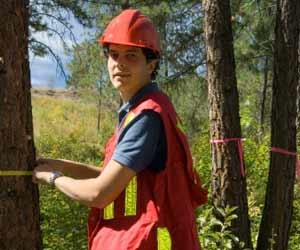Is Working an Outdoor Job the Right Job for You?
Working in the outdoors is not for everyone. You’ll be expected to work long hours, follow orders, and take on strenuous tasks. You could be required to
carry a fifty-pound pack, start work at 6am, or cover 50 miles by foot in a week. Weather conditions could bring pouring rain one day, scorching heat the next. You might dine on canned meat rations provided by the agency, or rainbow trout you catch yourself. Your co-workers could be forty-nine other seasonal firefighters, or just the birds and squirrels; your office a fir stand; your bedroom a tent. You might not get a shower every day, or you might wait half an hour for six minutes under lukewarm water.

Most outdoor veterans will tell you, though, that all your struggles are forgotten as you watch the completion of a new footbridge or the morning sunrise as the wildfires burn out. Read some comments from those who’ve been there. First, a man who has spent several summers working for the Park Service tells us how bad it can be:
“As far as backcountry work goes, you’re expected to be out for ten days in a row before coming in for your four days off. And ten days in a row can sometimes be pretty wet – this last summer the backcountry rangers didn’t see sun until the end of August. It’s pretty depressing when your clothes get wet in the first two days, and you can’t dry them out.”
A ranger who once worked for the National Park Service offers this description:
“Thousands and thousands of people dream of working in the outdoors. But to be willing to actually live outdoors in raw weather conditions for two months is another story. There’s a lot of dealing with yourself – you’re isolated, you have to entertain yourself, and you have to fight becoming frightened, weary, or bored. You might have to live in a smelly, wet sleeping bag for days on end. You might not see another soul for days, or you might see too many people, all in violation situations. Sometimes you see different people doing the same stupid things over and over. You have to accept the fact that not everyone is there for the same reason. There’s a lot of work involved, hard backbreaking work. But it is very rewarding, doing physical labor in a beautiful place.”
A drawback of seasonal work is the lack of stability it provides, as a veteran points out:
“Working seasonally can be stressful. You have to establish a temporary lifestyle, and that often means sacrificing a sense of community. You pay your dues. As soon as you start your job you know you’re going to have to start scrambling for another one within two months.”
Finally, one longtime seasonal worker stresses the importance of motivation.
“You have to want to do the job, and not just for a paycheck. There is very little supervisor contact, so you have to be self-motivated.”
Many people who take outdoor jobs to pay for education end up in office careers, with fond memories of their fresh-air jobs. Others have turned seasonal jobs into careers. Whatever the outcome, outdoor positions are for people who love being out in the open, don’t mind getting dirty from head to toe, and are willing to commit to spending many weeks in a remote setting.
Do you like the idea of getting out of the city? Working your tail off? Dealing with whatever nature dishes up? If so, a job in the outdoors is your ticket. In the words of one outdoor worker,
“If you want to get whipped into shape, grunt, sweat, and get dirty, good – because that’s exactly what’s going to happen. So be careful what types of jobs you apply for. Think hard about what you are willing to do.”

